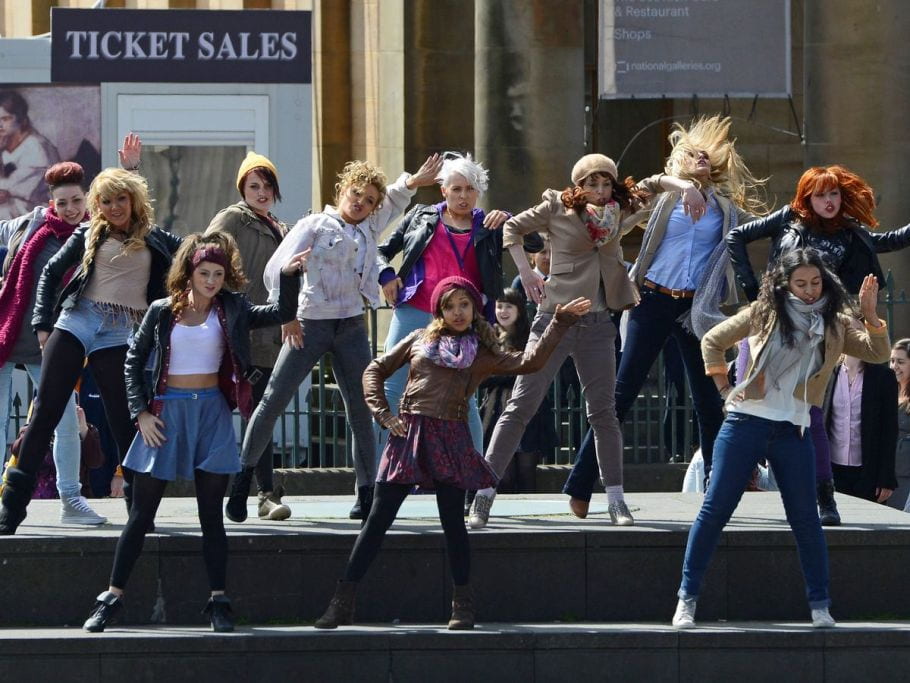If there is a genre of movies that people either love or hate, it’s movie musicals. Now, personally I love them but I can completely understand that some people don’t. You have to have a certain mindset to love and appreciate musicals, otherwise you might just end up thinking ‘why are they singing when they could just say when they mean’. But to those who do appreciate a good musical, there is still something that splits opinions, and that’s jukebox musicals. Most people either love them or hate them. These are the shows that solely use the music from a certain band/artist/creative or a collection of must from a certain genre and don’t feature a single original song. If the things I am describing do not appeal to you, then I suggest that you step away from this review as Sunshine on Leith is not only a movie musical, but a jukebox movie musical.
Released in 2013, Sunshine on Leith uses the music of famous double act The Proclaimers as a soundtrack to the lives of Davey (1917’s George MacKay) and Ally (Kevin Guthie), two soldiers adjusting to life away from the army as they return home to Edinburgh. Forced to deal with the issues that come from jobs, relationships and family life, both start to question what they really want to do with their lives.

Davey and Ally, as the film’s protagonists, drive the action forwards with believable story lines. In a way, both think that they have got it all worked out, but when faced with reality, they begin to realise that it can’t always be as simple and straight forward as they thought. With Davey, we see the new relationship between him and Yvonne (Antonia Thomas) begin to grow, if only they could agree, whilst he also see Ally struggling to hold a long term relationship with Davey’s sister Liz (Fiona Mavor) together. In the roles of Davey and Ally, MacKay and Guthie are both likable and believable, and easy to connect to. You feel for these characters and you want to see them succeed in whatever they decide to do with their lives.

What makes Sunshine on Leith good is it’s character development. Every character has their story and back stories, which drive every decision that they make. Sometimes, I have found, in films, characters are brought in from nowhere and are expected to make an impact, but they don’t have a convincing story of their own and they can disappear into nothingness. But Sunshine on Leith doesn’t have that issue every featured character has a story to tell. Fiona Mavor’s Liz dreams of adventure away from Edinburgh, whilst Yvonne (Thomas) is in two minds about living Scotland or England and struggles to share those concerns with those around her. Davey’s parents Jean and Rab (Jane Horrocks and Peter Mullan) have their own issues as a secret from Rab’s past comes back to bit him. These individual stories interlocking into the films overall plot line make for interesting viewing that is easy to invest in.

Many songs from The Proclaimers catalogue are used in the movie, with some better known than others and, of course, ‘I’m Gonna Be (500 miles)’ had to be given a big mention. That being said, my favourite musical moments in the film come from perhaps lesser known songs. The song ‘Over and Done With’ creates a wonderful moment in a pub scene early on, with ‘Should Have Been Loved’ giving Jane Horrocks a chance to shine alongside Jason Flemyng as her colleague Harry and ‘Letter from America’ providing a soft thoughtful scene towards the film’s conclusion.

Even though Sunshine on Leith sells itself as a fun loving, easy going jukebox movie musical, and the music does play a huge role that cannot be denied, but for me it is the well developed, believable and relatable characters that really sell it for me. These characters are selling stories that are worth investing in, so much so that this film would still be very enjoyable even without it’s catchy Proclaimers soundtrack.
